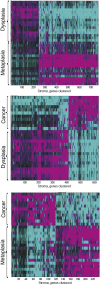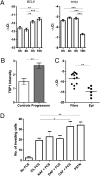Stromal genes discriminate preinvasive from invasive disease, predict outcome, and highlight inflammatory pathways in digestive cancers
- PMID: 20080664
- PMCID: PMC2836667
- DOI: 10.1073/pnas.0909797107
Stromal genes discriminate preinvasive from invasive disease, predict outcome, and highlight inflammatory pathways in digestive cancers
Abstract
The stromal compartment is increasingly recognized to play a role in cancer. However, its role in the transition from preinvasive to invasive disease is unknown. Most gastrointestinal tumors have clearly defined premalignant stages, and Barrett's esophagus (BE) is an ideal research model. Supervised clustering of gene expression profiles from microdissected stroma identified a gene signature that could distinguish between BE metaplasia, dysplasia, and esophageal adenocarcinoma (EAC). EAC patients overexpressing any of the five genes (TMEPAI, JMY, TSP1, FAPalpha, and BCL6) identified from this stromal signature had a significantly poorer outcome. Gene ontology analysis identified a strong inflammatory component in BE disease progression, and key pathways included cytokine-cytokine receptor interactions and TGF-beta. Increased protein levels of inflammatory-related genes significantly up-regulated in EAC compared with preinvasive stages were confirmed in the stroma of independent samples, and in vitro assays confirmed functional relevance of these genes. Gene set enrichment analysis of external datasets demonstrated that the stromal signature was also relevant in the preinvasive to invasive transition of the stomach, colon, and pancreas. These data implicate inflammatory pathways in the genesis of gastrointestinal tract cancers, which can affect prognosis.
Conflict of interest statement
Conflict of interest statement: J.S.H. and C.Z. are employees of Merck Laboratories.
Figures




Similar articles
-
Analysis of dysplasia in patients with Barrett's esophagus based on expression pattern of 90 genes.Gastroenterology. 2015 Nov;149(6):1511-1518.e5. doi: 10.1053/j.gastro.2015.07.053. Epub 2015 Aug 3. Gastroenterology. 2015. PMID: 26248086
-
Cellular and molecular mechanisms responsible for progression of Barrett's metaplasia to esophageal carcinoma.Gastroenterol Clin North Am. 2002 Jun;31(2):461-79, ix. doi: 10.1016/s0889-8553(02)00013-4. Gastroenterol Clin North Am. 2002. PMID: 12134613 Review.
-
Predictors of Progression to High-Grade Dysplasia or Adenocarcinoma in Barrett's Esophagus.Gastroenterol Clin North Am. 2015 Jun;44(2):299-315. doi: 10.1016/j.gtc.2015.02.005. Epub 2015 Mar 31. Gastroenterol Clin North Am. 2015. PMID: 26021196 Free PMC article. Review.
-
Gains and amplifications of c-myc, EGFR, and 20.q13 loci in the no dysplasia-dysplasia-adenocarcinoma sequence of Barrett's esophagus.Cancer Epidemiol Biomarkers Prev. 2008 Jun;17(6):1380-5. doi: 10.1158/1055-9965.EPI-07-2734. Cancer Epidemiol Biomarkers Prev. 2008. PMID: 18559552
-
Biomarker identification and trans-regulatory network analyses in esophageal adenocarcinoma and Barrett's esophagus.World J Gastroenterol. 2019 Jan 14;25(2):233-244. doi: 10.3748/wjg.v25.i2.233. World J Gastroenterol. 2019. PMID: 30670912 Free PMC article.
Cited by
-
Efficacy and safety evaluation of cross-reactive Fibroblast activation protein scFv-based CAR-T cells.Front Immunol. 2024 Jul 17;15:1433679. doi: 10.3389/fimmu.2024.1433679. eCollection 2024. Front Immunol. 2024. PMID: 39086477 Free PMC article.
-
New Strategies for the Treatment of Solid Tumors with CAR-T Cells.Int J Biol Sci. 2016 Apr 28;12(6):718-29. doi: 10.7150/ijbs.14405. eCollection 2016. Int J Biol Sci. 2016. PMID: 27194949 Free PMC article. Review.
-
Next generation sequencing-based expression profiling identifies signatures from benign stromal proliferations that define stromal components of breast cancer.Breast Cancer Res. 2013 Dec 17;15(6):R117. doi: 10.1186/bcr3586. Breast Cancer Res. 2013. PMID: 24342436 Free PMC article.
-
Disintegrin and metalloproteinases (ADAMs) expression in gastroesophageal reflux disease and in esophageal adenocarcinoma.Clin Transl Oncol. 2017 Jan;19(1):58-66. doi: 10.1007/s12094-016-1503-3. Epub 2016 Mar 30. Clin Transl Oncol. 2017. PMID: 27026568 Clinical Trial.
-
Tumor engraftment in nude mice and enrichment in stroma- related gene pathways predict poor survival and resistance to gemcitabine in patients with pancreatic cancer.Clin Cancer Res. 2011 Sep 1;17(17):5793-800. doi: 10.1158/1078-0432.CCR-11-0341. Epub 2011 Jul 8. Clin Cancer Res. 2011. PMID: 21742805 Free PMC article.
References
-
- Marx J. Cancer biology. All in the stroma: Cancer’s Cosa Nostra. Science. 2008;320:38–41. - PubMed
-
- Colotta F, Allavena P, Sica A, Garlanda C, Mantovani A. Cancer-related inflammation, the seventh hallmark of cancer: links to genetic instability. Carcinogenesis. 2009;30:1073–1081. - PubMed
-
- Kalluri R, Zeisberg M. Fibroblasts in cancer. Nat Rev Cancer. 2006;6:392–401. - PubMed
-
- Hanahan D, Weinberg RA. The hallmarks of cancer. Cell. 2000;100:57–70. - PubMed
-
- Maley CC, et al. The combination of genetic instability and clonal expansion predicts progression to esophageal adenocarcinoma. Cancer Res. 2004;64:7629–7633. - PubMed
Publication types
MeSH terms
Substances
Associated data
- Actions
- Actions
Grants and funding
LinkOut - more resources
Full Text Sources
Other Literature Sources
Molecular Biology Databases
Miscellaneous

